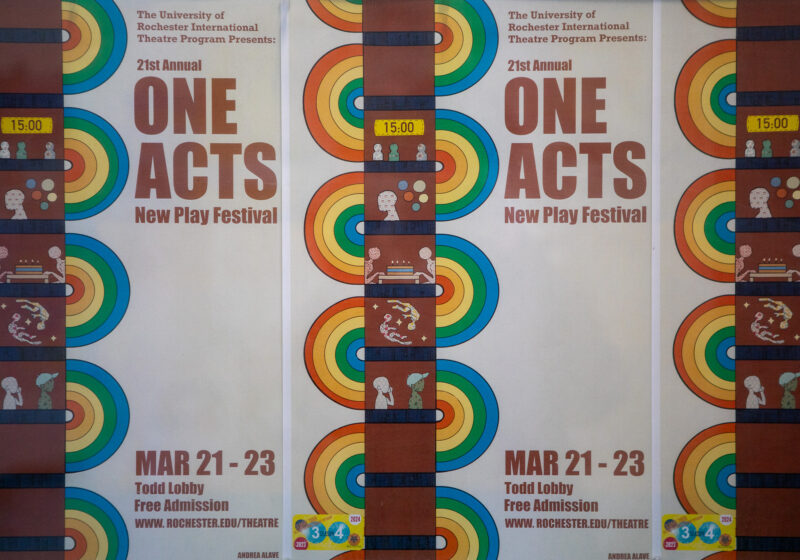After a hiatus due to the COVID-19 pandemic, the UR International Theatre Program (URITP) presented its 21st annual One-Act New Play Festival this past weekend. Featuring five compelling plays — each written, directed, designed, and performed by students — the festival provided a platform for authentic and diverse narratives to flourish onstage.
“One-Acts is very important because it enables students to just have a voice […] and be able to put themselves out there, especially with the stories that are being told. They’re very real, raw stories,” said Joan Oserogho, who returned as student artistic director after her first URITP production last semester.
These stories were alternatively comedic and tragic, beautiful and sincere. Take, for example, sophomore Soren Shahan’s “Moments/After,” which explored the loneliness and hurt that comes from two siblings separately navigating their queer identities amidst an unsupportive family. Under the excellent direction of junior Mercedes Stiner, this play was heart-breaking in its sincerity. Then contrast this with “Voices,” a fun and light-hearted piece (directed by first-year Yana Sponarovskaia) where we joined the internal narrators of a teenage boy’s mind as he went about his day.
“We get to run this as a group, just here with our creative minds […] trying things out and having it not work. But we get to experiment and learn by our own experience,” said sophomore Manita Opoku, writer of Voices. As wardrobe manager, first-time director, and actor in addition to playwright, Opoku exemplifies the range of talent typical of students involved in One-Acts.
She was one of three actors in “Exit Strategy” (directed by first-year Sophia Shakir and written by juniors Oren Schwartz and Drew Consorti) and directed “Press 9 Press 4” (written by sophomore Eunice Y. Lee). The first show was a heartfelt comedy that followed a young woman, her boyfriend, and her younger brother as they attempted to solve an escape room. The second was a tragedy that paid homage to the weight of grief as we watched a young woman struggle to cope with the death of her best friend in a school shooting. This piece, which Lee described as “a sort of culmination and reflection of growing up in America” was difficult to watch but well done.
It was followed by “Theories For The Death Of The Universe” (written by Shakir and directed by junior Keala Queja), which showed two students attempting to make sense of human’s meager existences while struggling with their own identities and relationships. The story was soft, realistic, and, like all the shows before it, a deeply personal love letter to both theater and early adulthood.
“Student-led productions like this one are so important because it gives us the opportunity to create and learn in an environment where everyone around you is learning too,” said junior Production Stage Manager River Baugh. A URITP veteran, Baugh has been involved in over 10 productions, and they find that One-Acts offers a liberating space for experimentation, creativity, and growth. The production team featured many first-time directors, stage managers, and actors exploring their skills through the lens of five unique shows.
“Their bravery and determination has been astounding,” Baugh said, speaking of the first-time stage managers. “I am so immensely proud of everything they have accomplished this semester.”
This sentiment can be echoed by every artist who contributed to the festival, both onstage and off — from the costumes to the lights, to the sound — and created a One-Act festival that was a beautiful testament to the talent and creativity of student artists at UR.


